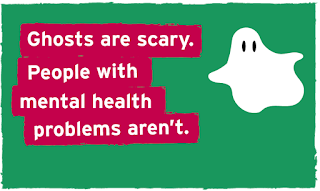Let's Talk About It: Mental Health
Trigger Warning: Anxiety, Depression, Suicidal ideations
July is Minority Mental Health Month! So, I thought this would be a great opportunity to talk about my own mental health journey. I want to help to normalize the conversation surrounding mental health. I know that talking about things like anxiety and depression can be difficult, but the more we talk about it the less difficult it gets. I also wanted to share my mental health journey in the hopes that it may resonate with someone, who may experience similar struggles, if anything to let them know that they are not alone. Finally, I want to talk about my mental health now, while I am in a place where my mental health is doing pretty well overall, because a lot of my anxieties and feelings of depression and worthlessness are closely tied with school.
As many of you know, I will be starting a masters program for genetic counseling in the fall; and while I can not express just how thrilled I am to go back to school, I am a little apprehensive. School has always been both a comfort and an anxiety trigger for me. My anxiety associated with school work wasn't really noticeable until I started college. The pressure of performing well in classes that were much more challenging than my high school classes really got to me. I also started to compare myself to my classmates, who seemed to be more prepared than I was as a freshman. I was always an A-student growing up, and held myself to a very high standard (I was basically like the main characters in Booksmart), but taking college-level courses was a huge adjustment for me. I put a lot of pressure on myself, because I wanted to maintain that standard of excellence I held for myself in high school. This developed into an extremely unhealthy relationship with academic validation, and I began to put all of my self-worth into how well I was doing in my classes. It only got worse as classes got more difficult. I took organic chemistry in my sophomore year, and created this internal reality in which I was barely able to keep my head above water. In reality, I was doing just fine, but I got frustrated with myself while studying, and would often leave my exams on the verge of tears. I can remember calling my mom after every exam and just sobbing. Because of this imagined reality, I would get super anxious in the days leading up to an exam. This would lead me to start studying a week, if not more, in advance, and regularly staying up until 2 or 3 AM to study. This is where I began to equate sleep deprivation with "hard work"–another incredibly unhealthy association.
I started to have thoughts like "I wish I were dead." or "I want to die.", because I didn't want to keep waking up everyday feeling obligated to go through life. Having suicidal ideations became a regular occurrence for me, and I started to stop taking care of myself. This carried on through my junior year, where I would regularly skip meals because I prioritized studying and "working hard", to the point where my roommates at the time had to remind me to eat. But in junior year I also decided that being Alice's friend was not worth the trouble, and started to focus on cultivating healthy relationships. This continued through my senior year, and while my suicidal ideations subsided, my anxiety and feelings of depression only amplified as school got more stressful. The first semester of my senior year was the especially difficult, as I was writing two theses, taking a full course load, and was no longer drinking coffee in an attempt to help my anxiety. I felt burnt out constantly, but with the end in sight I knew that everything I was feeling was only temporary.
Once I graduated from college, it took me a while to start to feel like my mental health was improving. I definitely went through a period where I felt depressed because I was no longer in school. It reminded me of scene in The Shawshank Redemption, where Morgan Freeman's character talks about men spending so many years in prison that they become so accustomed to the structure that they're institutionalized by the time they get out. That was me––I had been academically institutionalized, and suddenly I was forced to try to figure out who I was if I was no longer a student. It took some time, but with the help of close friends, finding new hobbies, and spending time figuring out what my next move would be, I was able to finally reach a place of emotional and mental stability. For the first time, in four (maybe more?) years, I finally felt more or less free from the constant barrage of anxiety and feelings of depression. (Of course, that all changed once I started the graduate school application process, but that's already pretty well documented on this blog.)
I knew that my anxiety and depression wouldn't just go away once I was out of school, but what I did learn was just how much school affected those parts of me. Which is why I made it my goal to find a mental health professional or therapist that I could see regularly while I am in grad school. This summer I will be shopping around for therapists, to make sure that I find one that is the best fit for me and to help with the transition into grad school. They say that hindsight is 20/20, and if I could go back in time, I would encourage my younger self to see a therapist or to utilize the on-campus counseling services. Unfortunately, I can't change the past, but I have grown from it. Now I have a good idea of how school affects my mental health and what kind of help I need to make sure that I am coping with the stress of graduate school in a healthy and productive way!
If you find that you are struggling with your mental health and want to find some resources regarding support or education, check out these websites:




If you're looking for a Life coach? So contact ours the Coach. I'm a Life Coach Counsellor we provide the Best family life counseling. For more info please visit our site or and click here: Best life coach in Georgia
ReplyDeleteher explanation dildo,horse dildo,sex chair,horse dildo,custom sex doll,sex chair,love dolls,sex chair,bulk sex dolls that site
ReplyDelete